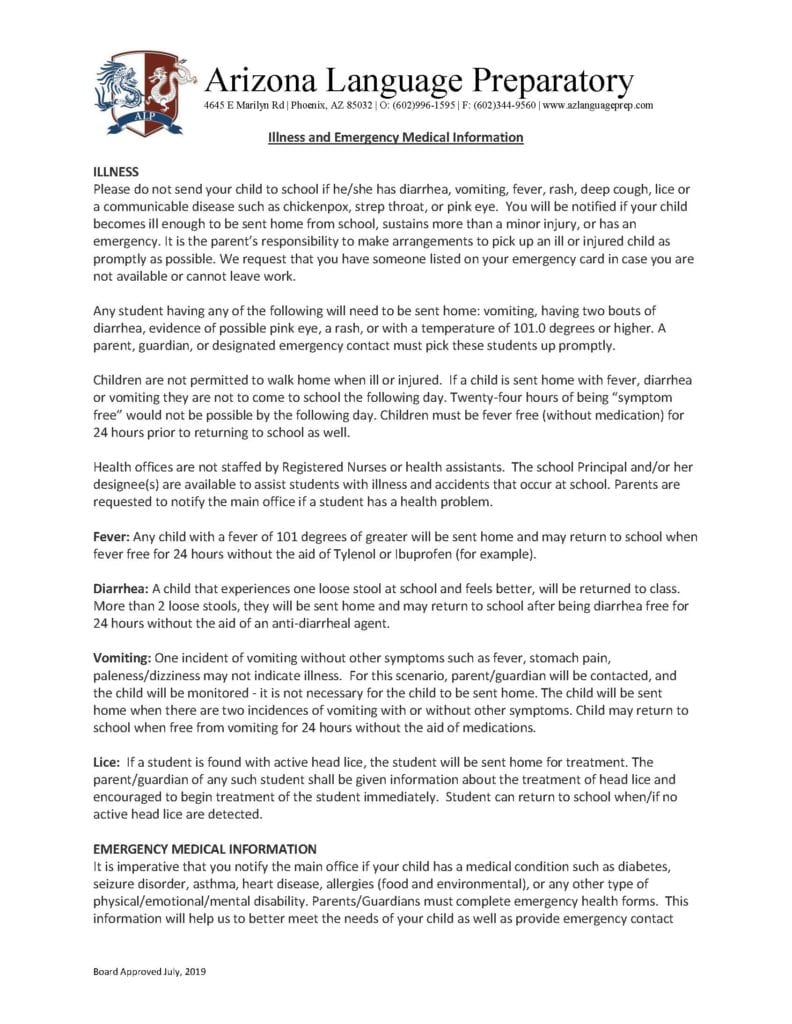ILLNESS
Please do not send your child to school if he/she has diarrhea, vomiting, fever, rash, deep cough, lice or a communicable disease such as chickenpox, strep throat, or pink eye. You will be notified if your child becomes ill enough to be sent home from school, sustains more than a minor injury, or has an emergency. It is the parent’s responsibility to make arrangements to pick up an ill or injured child as promptly as possible. We request that you have someone listed on your emergency card in case you are not available or cannot leave work.
Any student having any of the following will need to be sent home: vomiting, having two bouts of diarrhea, evidence of possible pink eye, a rash, or with a temperature of 101.0 degrees or higher. A parent, guardian, or designated emergency contact must pick these students up promptly.
Children are not permitted to walk home when ill or injured. If a child is sent home with fever, diarrhea or vomiting they are not to come to school the following day. Twenty-four hours of being “symptom free” would not be possible by the following day. Children must be fever free (without medication) for 24 hours prior to returning to school as well.
Health offices are not staffed by Registered Nurses or health assistants. The school Principal and/or her designee(s) are available to assist students with illness and accidents that occur at school. Parents are requested to notify the main office if a student has a health problem.
Fever: Any child with a fever of 101 degrees of greater will be sent home and may return to school when fever free for 24 hours without the aid of Tylenol or Ibuprofen (for example).
Diarrhea: A child that experiences one loose stool at school and feels better, will be returned to class. More than 2 loose stools, they will be sent home and may return to school after being diarrhea free for 24 hours without the aid of an anti-diarrheal agent.
Vomiting: One incident of vomiting without other symptoms such as fever, stomach pain, paleness/dizziness may not indicate illness. For this scenario, parent/guardian will be contacted, and the child will be monitored – it is not necessary for the child to be sent home. The child will be sent home when there are two incidences of vomiting with or without other symptoms. Child may return to school when free from vomiting for 24 hours without the aid of medications.
Lice: If a student is found with active head lice, the student will be sent home for treatment. The parent/guardian of any such student shall be given information about the treatment of head lice and encouraged to begin treatment of the student immediately. Student can return to school when/if no active head lice are detected.
EMERGENCY MEDICAL INFORMATION
It is imperative that you notify the main office if your child has a medical condition such as diabetes, seizure disorder, asthma, heart disease, allergies (food and environmental), or any other type of physical/emotional/mental disability. Parents/Guardians must complete emergency health forms. This information will help us to better meet the needs of your child as well as provide emergency contact information in case of illness or injury. Please remember to advise the Main Office of any changes in the home, employment or emergency numbers.
PHYSICAL LIMITATIONS
A child returning to school following a visit with a medical provider, with sutures (stitches – staples), an ace bandage wrap, sling, crutches, cane, walker, knee walker/scooter, or wheelchair – must have a licensed medical provider’s written permission to attend school that includes any recommendations and/or restrictions related to physical activity, mobility and safety. All equipment must be provided by the parent/guardian.
A note from the physician is required for the child to be excused from PE or other strenuous activity after 3 consecutive days of a parent note. Please contact the main office staff for more clarification if needed.
Parents/Guardians must contact the main office regarding the short-term use of crutches, canes, walkers, wheelchairs or other assistive walking devices. A physician’s note is required after a 72 hour ‘grace’ period. This additional information from the physician helps us to make emergency plans in the event of potential problems with ambulating or in the participation of activities such as recess or PE.
Board Approved July, 2019


